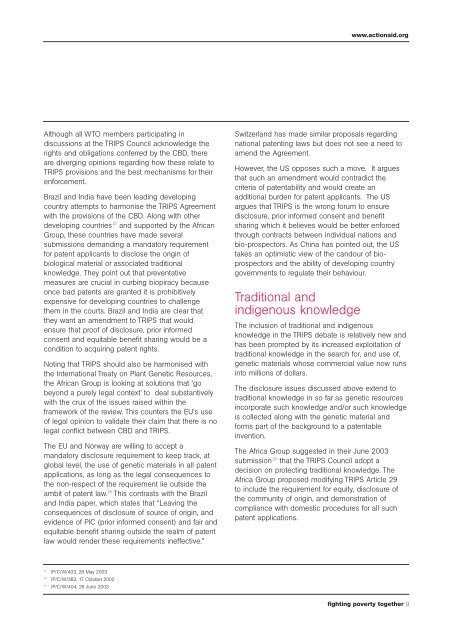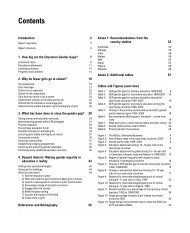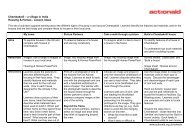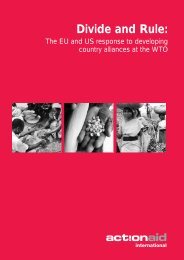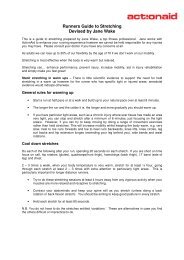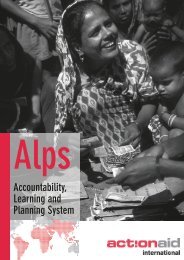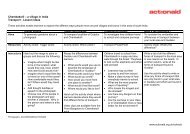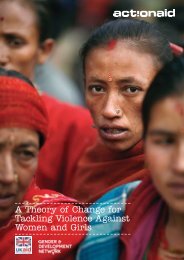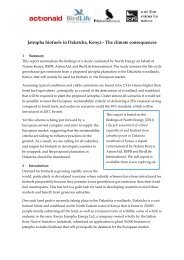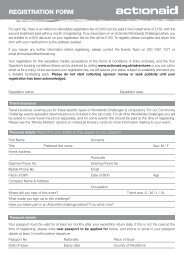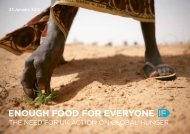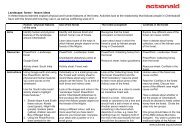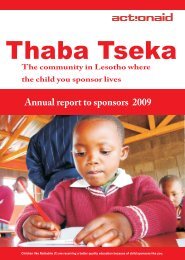Trade Related Intellectual Property Rights - ActionAid
Trade Related Intellectual Property Rights - ActionAid
Trade Related Intellectual Property Rights - ActionAid
You also want an ePaper? Increase the reach of your titles
YUMPU automatically turns print PDFs into web optimized ePapers that Google loves.
www.actionaid.orgAlthough all WTO members participating indiscussions at the TRIPS Council acknowledge therights and obligations conferred by the CBD, thereare diverging opinions regarding how these relate toTRIPS provisions and the best mechanisms for theirenforcement.Brazil and India have been leading developingcountry attempts to harmonise the TRIPS Agreementwith the provisions of the CBD. Along with otherdeveloping countries 27 and supported by the AfricanGroup, these countries have made severalsubmissions demanding a mandatory requirementfor patent applicants to disclose the origin ofbiological material or associated traditionalknowledge. They point out that preventativemeasures are crucial in curbing biopiracy becauseonce bad patents are granted it is prohibitivelyexpensive for developing countries to challengethem in the courts. Brazil and India are clear thatthey want an amendment to TRIPS that wouldensure that proof of disclosure, prior informedconsent and equitable benefit sharing would be acondition to acquiring patent rights.Noting that TRIPS should also be harmonised withthe International Treaty on Plant Genetic Resources,the African Group is looking at solutions that ‘gobeyond a purely legal context’ to deal substantivelywith the crux of the issues raised within theframework of the review. This counters the EU’s useof legal opinion to validate their claim that there is nolegal conflict between CBD and TRIPS.The EU and Norway are willing to accept amandatory disclosure requirement to keep track, atglobal level, the use of genetic materials in all patentapplications, as long as the legal consequences tothe non-respect of the requirement lie outside theambit of patent law. 28 This contrasts with the Braziland India paper, which states that “Leaving theconsequences of disclosure of source of origin, andevidence of PIC (prior informed consent) and fair andequitable benefit sharing outside the realm of patentlaw would render these requirements ineffective.”Switzerland has made similar proposals regardingnational patenting laws but does not see a need toamend the Agreement.However, the US opposes such a move. It arguesthat such an amendment would contradict thecriteria of patentability and would create anadditional burden for patent applicants. The USargues that TRIPS is the wrong forum to ensuredisclosure, prior informed consent and benefitsharing which it believes would be better enforcedthrough contracts between individual nations andbio-prospectors. As China has pointed out, the UStakes an optimistic view of the candour of bioprospectorsand the ability of developing countrygovernments to regulate their behaviour.Traditional andindigenous knowledgeThe inclusion of traditional and indigenousknowledge in the TRIPS debate is relatively new andhas been prompted by its increased exploitation oftraditional knowledge in the search for, and use of,genetic materials whose commercial value now runsinto millions of dollars.The disclosure issues discussed above extend totraditional knowledge in so far as genetic resourcesincorporate such knowledge and/or such knowledgeis collected along with the genetic material andforms part of the background to a patentableinvention.The Africa Group suggested in their June 2003submission 29 that the TRIPS Council adopt adecision on protecting traditional knowledge. TheAfrica Group proposed modifying TRIPS Article 29to include the requirement for equity, disclosure ofthe community of origin, and demonstration ofcompliance with domestic procedures for all suchpatent applications.27IP/C/W/403, 28 May 200328IP/C/W/383, 17 October 200229IP/C/W/404, 26 June 2003fighting poverty together 9


